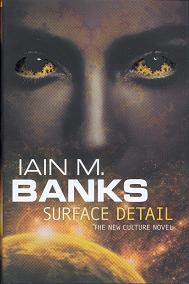
Surface Detail
Iain M. Banks
627 pages
published in 2010
The problem with any new Culture novel is that they'll never be as good as the original three -- Consider Phlebas, The Player of Games and Use of Weapons. Back in the late eighties when these books were first published there was literally nothing like them; now we know what the Culture is like, what to expect from Banks and there are whole generations of sf writers who have been influenced by him writing similar sort of novels. Yet everytime I still hope that the next Culture novel is as good as the first three, which is unfair -- even if it is, it won't have the same impact.
But Surface Detail comes close. From his first published book, The Wasp Factory, Banks has had a reputation for writing well crafted but often repulsive scenes of violence and torture and here he surpasses himself. Because in Surface Detail he gives us a horrifying but all too plausible idea: what if you could use virtual realities to create the hells your religion says sinners should be cast down into? What if civilisations routinely went through a stage in their development when their technology was good enough to create simulations of hell, but their morality still primitive enough to actually want to subject people to them? One of the first scenes in the book shows what that would look like from the inside and it's not for the squeemish; it actually gave me some bad moments reading it just before I went to bed. No cuddly fantasy hell this; imagine whole creative output of an entire species devoted to making up ever more cruel tortures, without end.
As you'd expect, the funloving do-gooders of the Culture do not approve of any civilisation that implements virtual hells for its post-dead. And for most, this disapproval from elderly meta-civilisations is reason enough to in time give up their artificial afterlives, but some remain stubborn. Yet starting a war in the Real to get rid of the offenders is a bit over the top, so a perfectly reasonable solution acceptable to all parties was found. The pro- and anti-hell sides get to fight their war in virtual reality, a war that has already been going on for hundreds of years. The scene in which we are introduced to the existence of virtual hells was part of that war, as two volunteers managed to infiltrate their religion's hell, the existence of which was always hinted at but never properly confirmed, though true believers in danger of backsliding do get virtual tours every now and again. By sacrifising themselve to unspeakable tortures for months, the volunteers manage to get the first real evidence back into the real world, but at a price. Meanwhile the war in virtuality is not going well for the anti-hell side and they are starting to cheat -- is the war coming back to the real world?
In the second storyline we meet Lebedje, a slave to Veppers, the richest man in a civilisation several levels below the Culture, a client civilisation of a client civilisation of a client civilisation. Lebedje has been a slave since birth, payment for the debts of her parents and has been trying to run away for years, only to be killed -- and then to wake up aboard a Culture vessel hundreds of lightyears away. It turns out she had a bit of Culture tech in her skull, which managed to upload her personality to the nearest Culture AI ship, payment for a service she had done for another ship. Lebedje now wants to return to her civilisation to exact revenge, but the ship won't let her, both for reasons of morality as for more realpolitical reasons: even in the supposedly post-affluence Culture his importance and wealth still protects him.
The third storyline meanwhile features one of the participants in the virtual war, as he lives and dies through war after war, rising in the ranks. There is also a fourth storyline, featuring a Culture agent interested in Lebedje and her revenge for her own reasons. All stories naturally tie together, resolved at the end of the book, with several surprises on the way, not the least on the last page.
In her review of Surface Detail in The Independent, Roz Kaveney ended with the complaint that "in spite of the horrors Banks gives us here, the general effect of this book is entertainment. Some of the Culture novels have more to them beyond the sheer brio that we take away here." Which is I think a bit too ungenerous. She's right that the costs of the Culture's ruthless pursuit of utopia was more on the display in the original three novels, but more so than in any of the other sequels, we see the dark side of the Culture here. Lebedje for example is the victim of an inhuman economic and political system that made her a slave before she was born, a system that is kept in place partially because it suits the interests of the client civilisation that mentors her own civilisation and who in turn are guided, at some remote, by the Culture. There are reasons for why this situation persists, good reasons even, but these do not balance the pain and suffering she went through; even Utopia isn't perfect.
Everything does work out well in the end, more or less and Roz is right in saying that "part of the point of creating the Culture is, for Banks and his audience, to have a universe in which things generally work out for the best", but he does show that the journey is not without cost either and good intentions nor good outcomes can take these away.
Webpage created 07-11-2010, last updated 29-11-2010.